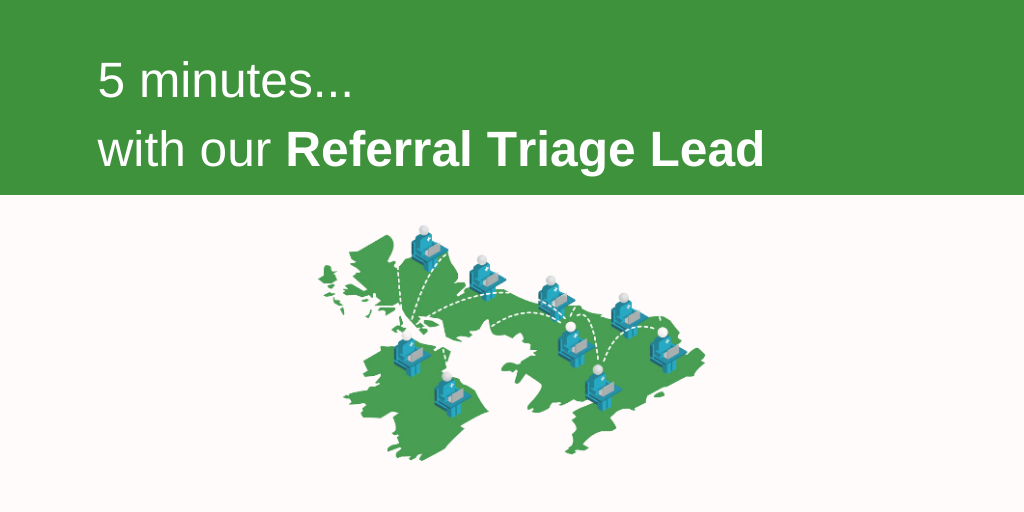In this article, we catch up with our Referral Triage Lead, Kat James, who has been working with NHS areas to help accelerate their recovery work over the past year.
What initiatives are you working on to help reduce backlogs?
“Triage is an important part of elective recovery plans across the country to ensure that those that need to be seen most urgently are seen first and that those who can be managed outside of hospital care are directed accordingly.
The main challenge remains staffing, and that’s why virtual capacities are welcomed in order to free up on the ground consultants for running clinics.
Our referral triage service has been well received as temporary support for hospital trusts needing additional temporary capacity. The service uses the expertise of the NHS consultants from our National Consultant Network (NCN).
The consultants work through backlogs in bulk, which often involves referrals that have been ‘stranded’ with no review to date, as well as long waiters lists to re-prioritise them and manage risks. Many trusts have opted to route new referrals as they come into our service, which means they are immediately triaged before they get onto any list.
It’s a ‘switch-on/switch-off’ model – as local capacities change, the service can be reduced or turned off completely.”
What impact does this work have on waiting lists?
“The key outcome is that referrals are prioritised according to urgency. And equally, the ‘virtual’ NHS consultant will identify referrals that might need to be seen in a different service within the hospital or a community setting. Those that are safe to be dealt with in primary care are returned with a full Advice & Guidance letter and management plan and a telephone number in case the GP has questions.
Our Referral Triage service has been supporting systems across the country, with over 20,000 referral reviews delivered across 14 specialties over the past year. We published results as of April 2022 in this blog article.
For example, at QEH, where we reviewed 1,000 Cardiology referrals over 7 weeks, nearly 50% of referrals were either sent back to primary care with a management plan or booked into a diagnostic test. This represents a significant freeing up of outpatient capacity. Although some patients may require an outpatient appointment after having diagnostics, this will be on a more informed basis with the additional information from the investigations being available to clinicians. As a result of this 7-week review of 1,000 Cardiology referrals, waiting times were reduced from 48 weeks to 41 weeks.”
Can the service support with diagnostics?
“Where necessary, the ’virtual’ NHS consultant will advise on the correct diagnostics to be initiated – whether the referral is accepted to be seen in hospital or returned to primary care. There is nothing worse than for a patient attending a first outpatient appointment after many months of waiting to be then told to join another waiting list to have their diagnostics done.”
You said that the “virtual” NHS consultant works as part of a local team. How does that work in practice?
“This service works so well because it is based on NHS consultants working with NHS consultants. Once we’ve allocated the ‘virtual’ NHS consultants doing the triage, we set up a briefing meeting with the local clinical lead for the respective specialty. It’s important to discuss what’s available in that area, for example, in terms of diagnostics in the community, rapid access clinics etc. If certain services are unavailable, the ‘virtual’ NHS consultant will be able to advise on the best alternatives and treatments in the interim. A sample from the first few referrals in a new project will have a second review from the local team to ensure everything is being reviewed according to the trust’s preferences.”
Many local teams already run a RAS service. How does the Referral Triage service add value?
“It really depends on how a RAS is set up. We have come across areas where a RAS is focused on identifying urgent cases but not on doing a full review of all referrals. This is where a consultant review adds immediate value. In other areas, it’s simply to free up local consultants currently delivering a full RAS for them to focus on running clinics and for us to deliver the ‘virtual’ work.”
What has changed operationally since the Referral Triage service started?
“When we first did this type of work in October 2020, we were dealing with ‘stranded” referrals only that had been built up due to the pandemic and that hadn’t had any reviews. Now that most elective services have resumed, we’re seeing more of a mixed picture of different triage work. We now often work alongside local teams doing some of the triage and us focusing on other parts. Consultant capacity remains the challenge for most trusts, and we’re in a position to tailor our work to fit exactly with the individual specialty at each trust we work with.”
For more information, please visit our Referral Triage landing page, email hello@consultantconnect.org.uk or call us on 01865 261 467.
Related Case Studies:
Related Blog Articles:
- Tackling gynaecology waiting lists
- Clinical validation of waiting lists
- Referral Triage shows significant impact in reducing waiting lists
- Referral Triage | Outcomes and Impact
- FAQs – Referral Triage
